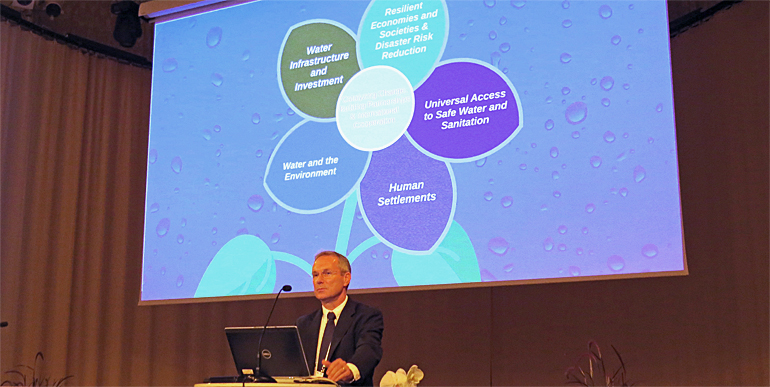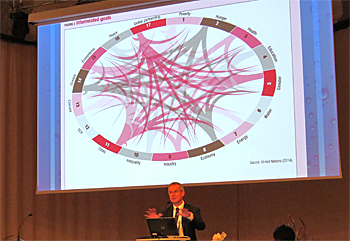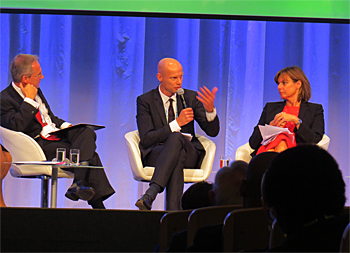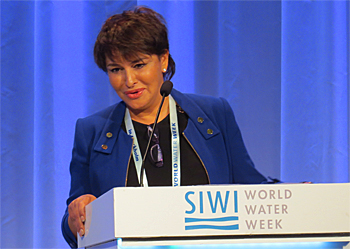Stockholm water week 2016: High level panel on water takes complexity of global water issues on board
 "We need to jump start on the implementation of the sustainable development goal #6 on water. Therefore we have identified areas where we think the big movements must happen", said Hungarian 'sherpa' Csaba Körösi, while showing a glimpse on the plans of the High Level panel on water (HLPW) at the Stockholm World Water Week on 31 August.
"We need to jump start on the implementation of the sustainable development goal #6 on water. Therefore we have identified areas where we think the big movements must happen", said Hungarian 'sherpa' Csaba Körösi, while showing a glimpse on the plans of the High Level panel on water (HLPW) at the Stockholm World Water Week on 31 August.
The HLPW was launched by the United Nations earlier this year and includes 10 head of states and their assistants (sherpas). These sherpas met during the Stockholm World Water Week to discuss the panel's plan of action.
Körösi (on top photo) told the gathered global water community in Stockholm that the full action plan will be released in New York on 21 September at the United Nation's annual General Assembly.
 Hungarian sherpa Csaba Körösi showed the crosslinks between the 17 sustainable development goals.
Hungarian sherpa Csaba Körösi showed the crosslinks between the 17 sustainable development goals.
Complexity of global water issues
By revealing five identified areas, Körösi showed that the high level panel wants to embrace the complexity of the water issues by establishing crosslinks with other goals such as resilient infrastructure (SDG #9), disaster risk reduction (SDG # 11) and nature preservation (SDG #15).
One of the crosslinks - often mentioned in Stockholm - is water and disasters. Many disasters are water-related. So by taking preventive measures on flood and drought, the water sector can contribute to reduce the impact of extreme weather events, thus allowing more economic growth and reducing poverty, thus enabling more expenditure on water related measures.
Another example is the crosslink with agriculture. By improving rural canal systems, farmers can change to continuous drip irrigation and can produce more crop per drop. Thus supporting the ending hunger, improving health and combating climate change.
Five areas for a quick start
The high level panel clearly recognizes these important crosslinks and wants to focus on five areas:
● resilient economies and societies and disaster risk reduction
● universal access to safe water and sanitation
● human settlements
● water and the environment
● water infrastructure and investment
 Dutch sherpa Henk Ovink advocated collaboration, rather than negotiations.
Dutch sherpa Henk Ovink advocated collaboration, rather than negotiations.
Home work for the water sector
To be able to address these areas, Körösi explained that the sherpas had identified three 'roots' that the global water sectors needs to improve:
● better water governance
● improve data on water
● improve valuing of water
Körösi urged his audience to innovate, collaborate and scale up: "Everyone's contribution will be critical".
The mandate for the HLPW goes for two years and the panel wants to be ready by March 2018 when the World Water Forum in Brasilia, Brasil takes place.
Process versus structure
Körösi did not address the issue of the institutes that will become responsible for achieving SDG #6. Informally this has been debated very lively in Stockholm. However, the sherpas wanted to prevent this discussion to dominate the more important issue of the process.
On several occasions Dutch sherpa and special water envoy Henk Ovink strongly advocated to implement 'inclusive processes'.
"Policy debate leads to negotiations", he explained "while an inclusive process for implementation leads to collaboration. We need the latter more than the first".
Better understand water complexity
Ovink reminded the water professionals that were present in Stockholm of the fact that such a process never ends. "We need to embrace complexity", he continued. "Implementation processes need to come from the understanding of the water complexity."
For the better understanding of this complexity and a comprehensive approach, Ovink warned for budget cuts on research. "It won't safe you real money but will cost a lot due to failing projects and missed opportunities. You spend a million on research, you spend a billion on a more impactful implementation!"
 Morrocan water minister Hakima El Haite invited the global water community to give input to the next climate summit - COP22 - in Marrakesh.
Morrocan water minister Hakima El Haite invited the global water community to give input to the next climate summit - COP22 - in Marrakesh.
Success of Paris
In Stockholm the global water community made clear it wants to build on the success of the Paris climate agreement.
As climate change has a big impact on water system, the water sector has a lot to offer to adverse the negative effects of a warming planet.
Moroccan water minister Hakima El Haite invited the water community to join the next climate summit, the COP22, in Marrakesh.
"We realise that the success of Paris sets high expectations. In Marrakesh we want to be able to show the climate community that the water sector already has solutions for climate adaptation."
El Haite mentioned that COP22 will have a focus on drought, a huge African issue.
Read also on this website
● Stockholm World Water Week 2016: Technical centres as water job generators in rural areas, 2 September 2016
● Stockholm World Water Week 2016: Watershed partnership pursues to hold governments more accountable for sustainable WASH services, 1 September 2016
● Stockholm World Water Week 2016: Akvo celebrates ten-years online monitoring water aid projects, 31 August 2016
● Stockholm World Water Week 2016: Taking sanitation to the next level, 31 August 2016
● Stockholm World Water Week 2016: Implementation of SDG6 on water gets into gear, 30 August 2016
● Stockholm World Water Week 2016: Dutch delegation to launch programme on sustainable water use, 25 August 2016
● Stockholm World Water Week 2016: Overview of the Dutch contributions
● Dutch prime minister Mark Rutte appointed to joint UN and World Bank high-level panel on water, 22 April 2016
More information
Stockholm World Water Week
www.worldwaterweek.org
High level panel on water
www.sustainabledevelopment.un.org



